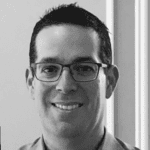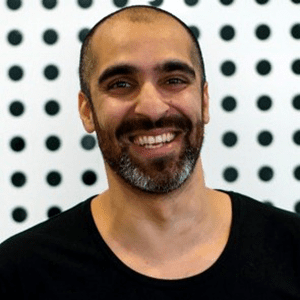

Leaders finding new ways to build trust and hope
Ron Schwartz explores leadership and the power of words in equations of hope and trust during challenging times. He’s a corporate change agent, organisational designer and business innovator with 20 years of experience in Australia, USA, Europe and parts of Asia.
Ron has partnered with CEOs, business owners and senior executives to enhance individual, team and organisational performance by aligning effort with intention.
Stephanie:Hello and welcome to TEC Live. Stephanie Christopher here, chief executive of the Executive Connection. TEC connects CEOs, executives, and business owners to the world’s largest business leader network.
Lia Crowley: This is TEC Live, doing it remotely because we’re all social distancing, including Stephanie. So let’s have a listen to this week’s TEC Live.
Stephanie: Thank you Lia. The hidden person behind the control deck normally in our recording studio. Welcome to TEC Live, somewhat live. Great to have you here and really excited to speak to our guest today, Ron Schwartz, corporate change agent and organisational designer. Over 20 years experience of working with companies across Australia, the US and Asia, amongst many other things. Ron Schwartz, welcome to TEC Live.
Ron: Hi Stephanie. Thank you.
Stephanie: Yeah, good to have you here. So we’re recording, today is the 3rd of April. So we’ve been in this fascinating time. It feels like we’ve been right in the heart of it for maybe two weeks or two past weeks. And I’m interested to know, what are you seeing from business leaders over the last two weeks?
Ron: So it’s really interesting. Because of the lack of intimacy, that people have not been in offices, which is the major work mode at the moment. Working, remote, virtual, distributed, whatever word you want to use. Because of that, they’re starting to find new ways to build trust, to build hope. And if we actually look at two of the main currencies we have as leaders in the current world, it is trust and hope. Knowledge. You think about what’s changed in the last two to four weeks, our knowledge is probably not so relevant. Our experiences not so relevant. But what is relevant to us as leaders, and what I’m seeing in a lot of leaders, is the desire to inspire hope and the desire to engender trust in an environment where we lack the same intimacy that we used to. And in fact we’re finding new ways to be intimate.
Stephanie:Well, yeah, and that’s really interesting, isn’t it? The power of what you can do over video now. And I have a feeling that people are actually almost hyper connected. The business leaders that I’m talking to are really looking for connection right now, because it’s been an interesting cycle. And I should’ve said up front that trust and hope were the topics for today. And I think they’re particularly pertinent because my experience has been, over the last two weeks, it’s been quite a scramble. It’s like the shockwave hit and how do I move the team remote? How do I keep business going? What kind of hit are we going to take?
It was a really rugged first week and pretty tough second week. I’m feeling as a leader, there’s potential now for a conversation about hope. Not because we know what the other side looks like. But there’s enough things that we can realise as leaders. There’s something else we need to be instilling in our teams right now.
Ron:Yeah, and one of the interesting components of hope that I think people are starting to get a better grasp of, is the concept of agency. Agency is one of the core components of hoping. If I don’t feel my effort makes a difference, how can I feel hopeful? And we’re seeing some amazing examples of leadership inspiring agency. You see businesses changing. Things like the Mercedes formula one team redesigning a CPAP machine, prototyping it and building 40 units, plus getting approval from the UK authorities, in the space of seven days. That’s an amazing example of an organisation redefining, another technical term, pathways. New pathways to create success and hope and then empowering their people in really meaningful ways to create something amazing.
Stephanie:So can you just talk a little bit more about… Why don’t we take a step back and talk about hope. What’s the equation of hope and then I’m going to get you actually to define the terms.
Ron: So if you think of hope theory and you take it back to its core elements, it’s a process, not an emotion. So the equation for the process is goals plus pathways multiplied by agency.
Stephanie: Goals plus pathways multiplied by agency.
Ron:Yes.
Stephanie:Okay. So goals we’ve talked about a lot and I think there’s something interesting about goals right now because five year, three year goals are irrelevant. Even a 12 month goal might be a bit tricky. I think there is something, and I had a wonderful leader this morning talking about it. It’s a three week goal. Maybe that’s what it is. Tell us what you mean by pathways?
Ron:Pathways are different ways to achieve the goal. If we have one way to achieve the goal and it doesn’t turn out, then we’re stuck. But being able to identify multiple ways to achieve a goal, actually creates hope because then people know that they have options. And one of the things that undermines our leadership or trust in our leadership, and also hope, is when we speak in absolutes and there’s only one way to get it done. So having pathways, not a pathway, is one of the things that can inspire greater levels of hope.
Stephanie:And one of the things, which I guess we’ll get to with agency, is a good leader right now would be involving the team in coming up with those alternative pathways.
Ron: Exactly. And I mean, that’s a wonderful segue into the concept of agency, because agency is really, do I feel my effort makes a difference? That’s really-
Stephanie: Do I feel my effort makes a difference? Okay.
Ron: And it’s one of the fundamental tenants of an achievement motivation, that you focus your effort where your effort makes a difference. If I don’t feel my effort makes a difference, I’m going to feel despondent, I’m going to feel hopeless. And unfortunately, we’re in an environment where things are changing so much day by day, but so much is out of our control and out of our influence. But if as leaders, we can then bring our people in, in this environment and give them that greater sense of agency, even in just work. In that few hours a day where they’re at work, it can actually change the way they feel as a human being during the day, not just as a worker, as an employee, as an associate or as a partner. It actually helps them feel better as a person and they take that away into their family environment as well.
Stephanie: I really like it and I think the leaders also right now, when you don’t always have the answers, that more often than not over the last two weeks, I haven’t had the answers. Not always. I haven’t. And some of the ideas from the team have been so powerful and useful. Tell me, Ron, how in this virtual world, how can you give more agency to your team?
Ron: It’s a really interesting challenge giving more agency, but a lot of it comes down to working with the other components of the equation, pathways and goals. So creating spaces for people to contribute. And I know that sounds a little bit trite, but actually silence in conversations. Now when you ask the question, we have a tendency to want to jump in and solve the problem, but it undermines the sense of empowerment and agency.
Giving people the opportunity to learn, asking them reflective questions at the end of the day. What did we achieve today? Even in redefining the goals, in some environments, you’re talking about three week goals. It might be daily goals. What does a great day look like today? What would we achieve? And then recognizing those successes. Those small things make a very big difference at the moment.
Stephanie:I just went to start to take notes as you were talking and then I remembered, Oh no, it’s a recording we can all listen back to you again. So thank you, that was a good thing. Do you know it comes back to being a good leader, so it’s stretching us as leaders now, because of the massive context. But I’m thinking back to Mike Logan talking about the questioning leader. And so now’s not the time, as a leader, to be, although maybe there’s times that it is right to be bang, bang, bang, this is what we’re doing. But for perhaps some of the bigger questions. It’s critical as a leader then to step back and allow reflection in the team. That’s really interesting.
Ron: Yeah, and probably one of the, if you want to call it a superpower, that we need to develop as leaders right now. And many of us have it as leaders, but we can always enhance it, is curiosity.
Stephanie: Yeah.
Ron: Working on what Mike talks about, in terms of questions. Really powerful open ended questions right now are one of the most important things you can do to inspire hope, because of the fact that it helps drive agency.
Stephanie:A superpower. Well, we all need that right now. Curiosity. That’s good. So I like how you said hope is a process not an emotion. Do you mean that just as a general philosophical point or just hope in the workplace?
Ron:Certainly, in the workplace. But I would say even philosophically. If you understand the equation, then in any situation you can encourage more hope, whether it’s in yourself or in others. Whether it’s a family environment. Whether it’s a geosocial conflict. If we understand the concept of hope and where it comes from and how we build it, then we can use it in almost any situation. If we know that it’s about, are we clear on where we’re going? Do we have ways to get there and does our effort make a difference? Then we can apply that in any situation. So I guess in a way I do believe it is philosophical rather than just in the workplace.
Stephanie: I love it. Where do leaders go wrong in that equation, do you think, the most?
Ron: The most is probably… Actually, it’s a bit of everything. We get a little bit command and control sometimes, especially when we’re short on time and there’s a crisis. So usually what happens when we get command and control is we narrow the number of pathways and we reduce agency. This is the way we are going. So there’s one pathway and there’s little, if any, agency. we also sometimes forget to reiterate the goals and you know what? Sometimes the goal has to change. It’s a bit like the halftime chat in a game of football or something. You want to win the game, but you’re 30 points down halfway through. And it’s funny talking about football now, given that we’re not playing football for quite some time. But you’re 30 points down. Is the goal of winning the game still the right goal in that situation?
It may well be, but at least you need to ask yourself the question. We are where we are, we can’t change that. What’s the best outcome we can get from here? And if we fail to do that and people still pursue goals that are no longer relevant, then we’re going to feel low agency again. Because our effort isn’t going to be making difference to the real goals, just the one that we have written now. So losing relevance of the goals is also another place where we fall down.
Stephanie:And I’m thinking back to coaching. I’m thinking of the classic grow model of coaching, it’s all about helping someone come up with the options, isn’t it?
Ron: Exactly.
Stephanie: So again, back to what a good leader is doing right now.
Ron: Exactly.
Stephanie:What about trust? And doesn’t matter which order you do them in. They’re both so important. But tell me the trust equation.
Ron: Yeah, so the trust equation, I mean many of the listeners would have heard about it. Charles Green and Maister talked about it first in The Trusted Advisor many years ago. But it’s been bastardised many times, but really the trust equation is relevant in any situation as well, not just in a consulting relationship. And the trust equation, at it’s simplest level, is credibility plus reliability plus intimacy, all divided by perceived self-interest. So perceived self-interest erodes trust, credibility, reliability and intimacy. Build trust.
Stephanie:Yeah. Okay. So talk about perceived self-interest right now in this context. How could that rear its ugly head?
Ron:Oh, unfortunately it could rear its head in many ugly ways at the moment, but I guess fortunately we’re not seeing it do that. We’re seeing amazing examples of selflessness coming out in the corporate world, within teams and within individuals. But it’s very hard to understand why someone’s doing something when you’re not with them. So perceived self-interests. Small things can be misinterpreted as being self-interest. Things like some of the decisions that leaders are having to make about layoffs, stand downs. Is that really about the best interest of the company or is it about the best interest of the profit? And what they take out of the business. That’s probably the most common way self-interest would be interpreted in actions at the moment. You can imagine that in micro levels, as you’re making decisions on how you allocate team resources, how you are scheduling your meetings. Things like that could very easily be interpreted through a self-interest lens if we’re not careful.
Stephanie: Yeah. Okay. So let’s go to the above the line then. What was it? Credibility plus reliability equals intimacy. Is that right?
Ron:Credibility plus reliability plus intimacy.
Stephanie: Oh, plus intimacy. Okay. All on camera. Equations on camera, my idea of heaven. Okay. So tell me about… Why don’t you talk through those three?
Ron: Yeah, so credibility is really, I guess in its simplest sense, do I believe that you can do what you say you can do? Reliability. Do we have a track record of delivering? Or have you let me down in the past? And intimacy. Do we know what’s important to each other? Do we really connect? In the past I used to joke about it. It’s not about do we all go and have beers together? In today’s world, we can’t have beers together in the way we used to. So it’s really about understanding people at a deeper level. What’s really important to them.
Stephanie:I think that there’s different levers for leaders to use right now. Because it can be hard to be credible when no one’s ever been through this ever. And when you can’t forecast and you can’t predict when the team ask a question, how long will we be working from home? You can’t even tell them that. So I think intimacy is the most powerful lever that we have as leaders right now. And it’s amazing how you can get that in a virtual world.
Ron: Yeah, it is. It’s absolutely amazing. And I would sort of add that reliability as well.
Stephanie: Yeah. Yeah.
Ron:There’s a bit of reliability that we can start leveraging here, but intimacy. Yeah, it’s surprising. Even by having a video conference and seeing what’s in the background in the person’s video. I was on a call and you could see a guitar and the piano in the background and you instantly know that person’s a musician. That may not have even come up in a conversation in the past. But you note that and then to demonstrate that intimacy even further, if the opportunity comes up to recognise that person, you can recognise them in some form that’s musical.
Send them some credit on iTunes so they can download a song or shoot them a video of someone playing a great song on guitar. You know that that’s going to resonate with them. So it shows an even greater level of intimacy. It’s almost like the five languages of love, that book and the theory behind it. We can apply a lot of that even in today’s world without being physically intimate and close to people, we can still use the learnings out of that by customising our messages, by being truly intimate in that way.
Stephanie: Yeah. I think that’s really lovely. And in a way, I think I’ll miss that when we all go back to whatever we go back to. Although I don’t think anyone will ever, what everyone’s talking about, how the world of work is going to change finally.
Ron: Yeah.
Stephanie:But the connection is very strong and it is lovely seeing people at home and even the way it’s shifted that it’s actually acceptable for your child to appear in the picture or your dog to bark or whatever. I think that’s really interesting how we’ve all changed as a working world and working community. So quickly. So quickly.
Ron:Yeah. And I think we still have in the back of our minds, it’s going to be interesting to see how things go when we change back. I really do wonder how much of it will change back. I was actually doing a TEC talk a couple of weeks ago and one of the CEOs said that they were trying to drive a transformation for years and it didn’t work. And then in the space of three days they succeeded. There are lots of things that are going to… Lot of assumptions, beliefs, experiences that we’re going to have to liberate ourselves from. And in liberating ourselves even only for three months, six months, however long it is, we’ve liberated ourselves from them so we don’t need them anymore. So as we now go into this new world, this may well be the new norm. We don’t know what it’s going to be.
Stephanie: No, we don’t. We don’t. And I think in a world where we don’t know what’s ahead or what it’s going to be, trust and hope are two critical elements. And, Ron, I really like the idea of pathways to your goals and coming up with different pathways. Agency is critical and I think there’s a lot for us all to really think about and reflect on as leaders there. And the idea of a curious leader is more important than ever. And then where trust comes from, what drives trust and how to be really intentional about intimacy in this fun, crazy ride we’re all on. I think the timing for this conversation has been so helpful. And the theme of it, trust and hope, just really beautiful. And Ron Schwartz, thank you so much for joining us on TEC Live.
Ron: Thank you for the opportunity.
Stephanie: So that’s TEC Live for today. CEOs are in the business of making decisions and leadership is the art of execution. I’m Stephanie Christopher and look forward to talking to you next time.



